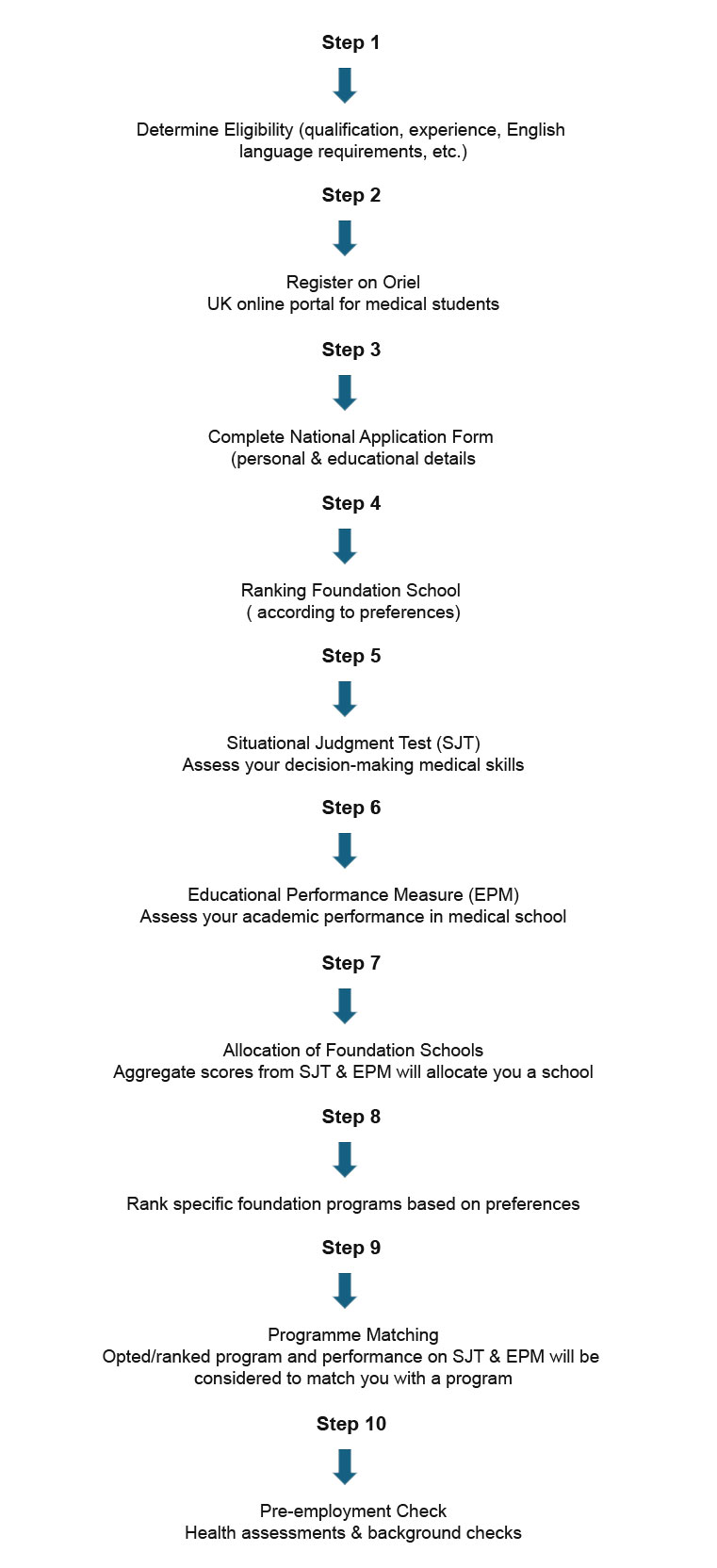UKFPO Program Complete Guide


UKFPO is a crucial step for anyone who wants to practice medicine in the UK after graduating from medical school, whether trained in the UK or overseas. Here, you will undergo two-year structured web-based training by the UK Foundation Program (UKFPO). This program enriches and equips you with clinical experience, supervised training, and professional skills. It facilitates preparing the General Medical Council (GMC) registration for UK and international medical graduates.
Table of Contents
- Overview of UKFPO
- Step-wise Guide to Application for UKFPO
- English Language Requirements for UKFPO
- Terms & Conditions for English Language Tests
- UKFPO Application Timeline
- UKVI IELTS Academic
- OET for Medical Graduates/Professionals
- Top Tips to Achieve UKFPO Required Scores
- Preparatory Material IELTS & OET
- IELTS VS OET: Which One Should You Take?
Overview of UKFPO
It is highly competitive since it is based on the criteria of the Educational Performance Measure (EPM) and the Situational Judgement Test (SJT). This article guides you through the UKFPO application process and gives detailed information on mandatory UKFPO English language requirements as one of the eligibility criteria.
Step-wise Guide to Application for UKFPO


English Language Requirements for UKFP
English language proof is mandatory for all the applicants, whether from English-speaking countries or non-English speaking countries. The candidates who studied in medical school in an English-speaking country with English as their native language will submit a Primary Medical Qualification (PMQ) certificate as part of their application. For international medical graduates in non-English speaking countries, UKFPO accepts ONLY two English language proficiency tests with specific terms and conditions for medical graduates. The minimum accepted scores for each of them are given in the table below:
English Language Proficiency Test Scores Required by UKFP
| Test | Listening | Reading | Writing | Speaking | Overall |
|---|---|---|---|---|---|
| IELTS | 7.5 | 7.5 | 7.5 | 7.5 | 7.5 |
| OET | 400 | 400 | 400 | 400 | – |
Terms & Conditions for English Language Tests
These are the specific terms that must be met for the successful application of an eligible candidate:
- IELTS / OET must be dated two years or less from the test date to the start date of the training program.
- You must share your results for OET through your online portal.
- You must provide IELTS, OET or PMQ at the time of application.
- You will not send any hard copies of the test results.
- You cannot combine OET scores from two sittings.
- IELTS One Skill retake (OSR) is allowed subject to the IELTS verification portal
- IELTS Academic UKVI is the ONLY acceptable version of the IELTS test.
- IELTS indicator test or IELTS equivalency will not be acceptable.
- OET@Home with the proctored version by OET is acceptable.
- No exemptions or exceptions are made in terms of English language tests.
UKFP Application Timeline
You can apply and keep track of your application with the help of the following timeline given in the table below:
| Course of Action | Month |
|---|---|
| Application Open | September |
| SJT exam | December to January |
| Result Announcement | March |
| Allocations Announcement | April |
| Start of Program | August |
UKVI IELTS Academic
In general, the 7.5 band in each module is challenging to achieve. However, with the proper guidance, authentic content, practice, and simulation mock tests, you can obtain the required score for the UKFP application and fulfil your dream of working in the UK. For your understanding, the band 7.5 has been explained below:
UKVI IELTS Academic Description for UKFP
| Band | Performance Required | Description |
|---|---|---|
| Listening (7.5-8.0) | 32-36 out of 40
| Understand complex and detailed speech |
| Reading (7.5-8.0) | 33-36 out of 40 | Comprehend implicit & explicit meanings |
| Writing (7.0-7.5) | Band Descriptors TaskResponse Cohesion & Coherence Lexical Resource Grammatical Range & Accuracy | Express ideas clearly and coherently with good structure and vocabulary |
| Speaking (7.0-7.5) | Band Descriptors Fluency & Coherence Pronunciation Lexical Resource Grammatical Range & Accuracy | Communicate fluently |
| Overall Band 7.5 | Good User | Effective Command of English |
OET for Medical Graduates/Professionals
OET is a medically contextualised English language test for healthcare professionals and graduates to evaluate their clinical communication skills in English. It has four subtests: Listening, Reading, Writing, and Speaking. There are three versions of the OET test, including the OET Paper-based Exam, the OET on Computer Test, and the OET@Home, and you can take either of the three versions for the UKFP application. An overview of the subtests and assessment criteria has been shared below:
Overview of Listening, Reading, Writing, and Speaking Subtests
| Subtests | Content | Assessment & Scoring | Performance Required (Each Subtest) |
|---|---|---|---|
| Listening (~50mins) | Part A: 24 questions 2 Recordings (12 questions each) Notes completion
Part B: 6 questions 3-option MCQs
Part C 12 questions 2 Recordings (6 questions each) 3-option MCQs
| The questions in the listening subtest assess your ability to listen for details, comprehend, identify the speaker’s opinion, follow extended conversations and interpret accurately. |
400 Grade B Can communicate effectively with patients and healthcare professionals using appropriate register, tone and lexis with only occasional inaccuracies and hesitations. Shows good understanding in a range of clinical contexts. |
| Reading (15 mins + 45 mins) | Part A: 20 questions 1-7 Matching Questions. 8-20 Fill in the blanks. Part B: 6 questions (6 workplace extracts) 3-option MCQs
Part C: 16 questions 2 long texts 4 option MCQS questions
| Reading the subtest requires scanning the text, locating relevant information, identifying the main idea and purpose, and understanding the implicit and explicit meanings.
| |
| Writing (45 mins) | Case Notes Reading Letter Writing | Writing a subtest assesses your language, grammar, content, genre knowledge, organisation, and clarity in written expression. | |
| Speaking (20 mins) | Role Plays between
Healthcare Professional (You)
And Interlocutor (Patient) | In the speaking subtest, you are assessed for intelligibility, fluency, appropriateness of language, grammatical knowledge and use, relationship-building skills, and interpersonal communication skills. |
For more information, please read OET Exam Format in 2025 to understand each subtest and approach to questions.
Top Tips to Achieve UKFP Required Scores
The minimum acceptable scores required by the UKFP demand special attention, preparation and hard work. You can surely achieve your desired scores if you follow some of the tips given by experts:
Tips for IELTS:
- You should know about IELTS Listening Test Tips, Tricks and Strategies
- Practice as many listening tests as you can
- Learn about IELTS Reading Strategies to Score Full Marks
- Solve
- IELTS Writing Criteria
- Read IELTS Essay Writing Topics and Samples
- Understand report writing with the help of Sample IELTS Reports
- Practice IELTS Speaking and achieve 7.5
- Learn IELTS Vocabulary for High Band Score
- Revise IELTS Grammar to score higher
- Take the IELTS Speaking Mock test to be 100% confident
- Get the IELTS trainer’s feedback on the Writing Module with an Estimated Score & Expert Corrections
Tips for OET
- Prepare using authentic OET Listening guide materials
- Practice as many OET Listening Tests as you can
- Understand OET Reading Format, Tips and Materials
- Solve adequate OET Reading Practice Tests
- Read OET Writing Samples and Tips for Writing
- Analyse and understand the OET Speaking Sample
- Understand the OET Speaking Assessment Criteria
- Revise and Practice OET Grammar for OET writing
- Get OET experts’ feedback from Benchmark OET Writing Correction – Grade B or 400 Score
- Maximise OET Vocabulary with Exam Words List and Tips
Preparation for IELTS & OET
Now, here are some guidelines for your preparation!
You must proceed in the steps below to score 400 on your first attempt.
Step 1: Planning
Planning is the first step, and you should make a reasonable plan while considering your dedicated study hours and other commitments. You can also consider a plan and guidance suggested by Benchmark for How Much Time Needed to Prepare for OET
Step 2: Preparation
The next step is to familiarise yourself with the test’s format, content, layout, and do’s and do n’ts. Then, you will start preparing using authentic and relevant content.
Step 3: Practice
Once you understand the test and its assessment criteria, start practising with authentic content.
Step 4: Take the Mock Test
You should continually evaluate your performance when preparing for the official test. Taking a mock test is the best way of getting your estimated scores. If UKFP requires 7.5 in IELTS and 400 in OET, you must get these scores in your mock test to pass on the first attempt.
OET Mock Tests & Sample Tests IELTS Speaking Practice, Course & Mock Test. The mock practice will give you your evaluation and identify the areas in which you need more attention.
Step 5: Book the Test
The last step is booking your official test, which is crucial in understanding the booking platform and selecting the correct information during the booking process. You can check OET Test Dates 2025 | OET Exam Centres to Book your OET test. Remember to keep enough time for revision and work on weaker areas identified by the mock test results while booking the test.
IELTS OR OET: Which One Should You Take?
This is a tricky decision, but we will make it easier for you to decide whether to take IELTS or OET for your UKFPO application. As you can see from the details above, the IELTS required score is band 7.5 overall, and the OET acceptable score is 400. These scores are tough and challenging as both lie on the Common European Framework of Reference (CEFR) scale of C1, which means a proficient user of English. Remember that both tests require preparation, dedicated study hours, practice and sheer hard work.
Let us give you a brief overview of the differences between both tests in the table below:
| IELTS | Areas | OET |
|---|---|---|
| General & academic content | Listening & Reading | Medical content only |
| Report & Essay Writing | Writing | Writing a Letter (medical profession specific) |
| Speaking on various topics | Speaking | Role play acting as a doctor |
| Varied tasks from multiple disciplines | Tasks | Real-life simulated tasks relevant to the medical field |
| Grammatical Range Accuracy Lexical Resource Task Achievement Cohesion & Coherence
| Grading For Writing | Purpose Content Conciseness & Clarity Genre & Style Organization & Layout Language (Grammar+Vocabulary) |
| Pronunciation Fluency Lexical Resource Grammatical Range Accuracy | Grading for Speaking | Linguistic Criteria Clinical Communication Criteria |
| English communication skills are focused | Overall Focus | Clinical communications skills focused. |
After understanding the nuances between both tests, we would like to provide some guidance on making the right decision for you.
The OET test is based on medical content and contexts, and you are a medical professional, which makes you more comfortable with texts from healthcare fields. However, you can take IELTS if you like to read in different genres, listen to podcasts or TED talks, and feel confident with report writing and essays. The more exposure you have to the content, the better your performance on that test. Neither is easy, and you cannot decide randomly on some fellow’s advice about your skills and capabilities. You should take mock tests of each before making the official bookings. This will ensure the right decision and give you a clear view of your evaluation for test-taking skills.
Conclusion
This was all about the UKFP application process and English language requirements. We are here to help you fulfil your aspirations; you can read through every process, follow preparation guidelines, use authentic content for practice, book your test at your convenience, and live your dream of working in the UK as a medical professional.
If you have any other questions, feel free to contact us!










